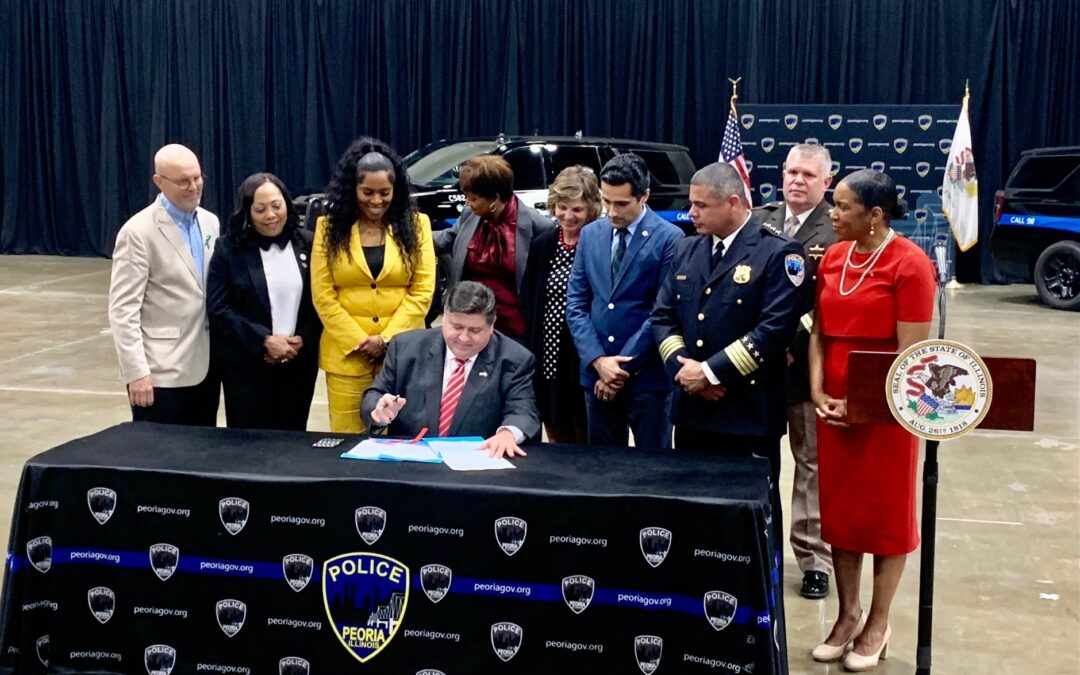Press Release – Tuesday, May 10, 2022
Peoria—Governor Pritzker today signed HB4736, authorizing the creation and funding of the Co-Responders Pilot Program. The pilot will support police in areas across the state in teaming up with social service agencies to address the root causes of disturbances or crime. Initial programs will launch in Peoria, Springfield, East St. Louis, and Waukegan in the next six months.
“We know that building a safer Illinois means approaching crime from every possible angle,” said Governor JB Pritzker. “This program combines the necessary skills of police with the specialized training of social workers and mental health professionals to address the root causes of crime compassionately and safely. This is supported by data and by what law enforcement officers on the ground are telling us about the incidents they’re addressing.”
The Co-Responder Pilot Program authorizes police officers to bring social workers and mental health professionals on calls to assess if the person is experiencing a mental health crisis. Law enforcement and social workers can then decide if a mental health facility or other supports could address their needs and behaviors. Governor Pritzker’s FY23 budget allocated $10 million dollars to fund this pilot.
In addition to the Co-Responders Pilot Program, the bill addresses victim’s rights and public safety holistically by mandating trauma-informed training for homicide investigators, authorizing funding to the Violent Crime Witness Protection Act (previously the Gang Crime Witness Protection Act), and creating a grant program to create tip hotlines or other victim and witness resources.
Governor Pritzker also signed two other bills into law as part of his administration’s research informed and multi-pronged approach to public safety and victim’s rights:
- HB3863, a bill addressing the strain put on first responders and the difficulties associated with attracting and retaining officer. This fund recognizes the challenges and stresses presented by a career in law enforcement and offers retention incentives and recruiting funds to preserve force numbers.
- •HB 2985, which authorizes the creation of a fund to directly pay funeral expenses of children murdered due to gun violence. Previously, families had to pay for these expenses upfront and then apply for reimbursement, placing a financial burden on those most in need of support during a time of tragedy.
“As head of the Justice, Equity and Opportunity Initiative, I am proud of these critical pieces of legislation,” said Lt. Governor Juliana Stratton. “The bills signed today build on our efforts to create a statewide anti-violence strategy that is rooted in care, compassion, and investment in communities’ wellbeing.”
“This is 21st century policing where a collaborative approach with law enforcement and behavioral health professionals is designed to create better outcomes for both officers and the community,” said Leader Jehan Gordon-Booth (D-Peoria). “As part of a comprehensive approach to address public safety, this measure will set up new units within departments to connect violence survivors with trauma-informed crisis intervention, assistance with finding safe housing and counseling. It also helps to bring needed security for crime witnesses, offering real financial assistance for relocation and temporary living costs.”
“Everyone in every zip code should feel comfortable being able to walk down the street,” said State Senator Robert Peters (D-Chicago). “No matter where you are, who you are or where you live you should deserve to feel comfortable and safe. This measure does that by expanding witness protection and by incorporating the voices and needs of stakeholders and survivors.”
“Crime is on the rise in all corners of our state, and staffing shortages are hindering police from best protecting their communities,” said State Senator Julie Morrison (D-Lake Forest). “The laws signed today support the valuable work that law enforcement does in every day and every hour and will help make our communities safe.”
“When we listen to law enforcement, we understand that there is a real need to assist with recruiting and retaining officers,” Representative Dave Vella (D-Rockford) said. “This measure helps direct needed resources to that effort and is another example of us listening to and working collaboratively with law enforcement. This is going to help us secure quality officers for our communities.”
“Losing a child to violence is unimaginably horrific, and we should do what we can to support these families in their most difficult hours,” said State Rep. Camille Lilly (D-Chicago) “It’s truly unfortunate that we even have to consider legislation like this. As someone who has experienced this tragedy in my family, I am hopeful that this new law will help ease the financial burden families face so that they can properly honor their lost one. May peace and comfort be with the families.”
“It is necessary that we create a process that financially and emotionally supports grieving Illinois families facing the harsh realities of a child’s death from gun violence,” said Leader Jacqueline Y. Collins. “I am eager to see this relief remove some of the burden of gun violence, and though nothing can take away the pain of losing a loved one to needless crime, I hope to ease the torment with this legislation.”
“Losing a young child to gun violence is among the most horrific tragedy a family could experience. Nobody plans to bury their murdered child-it’s among the worst unplanned expenses for anyone. Today the average cost of a funeral is $9,500 and many families are forced to rely on crowdsourcing or donations to pay for these costs,” said Dr. Dave Nayak, President and Founder of the Strength to Love Foundation. “The Mychal Moultry Jr. Funeral & Burial Assistance Act will immediately provide direct payments to the funeral and burial service providers so that families can complete the respectable funerals and burials they desire for their murdered children. This law provides a light for those families during the darkest times in their lives.”
Source: https://www.illinois.gov/news/press-release.24877.html

